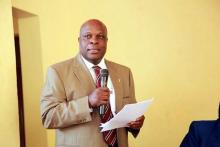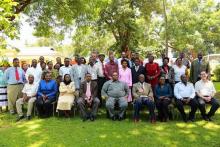Stakeholders' Meeting on the introduction of Human Papiilloma Virus (HPV) Vaccine kicks off in the United Republic of Tanzania
On 3rd March 2014, the Ministry of Health and Social Welfare with support from the World Health Organization, held the stakeholders’ meeting introduction of HPV vaccine in Kilimanjaro Region in preparation for the launch of the HPV Demonstration Project. The HPV Demonstration Project aims to demonstrate how the HPV vaccine targeting girls aged 9 to 13 years can be delivered in routine settings while looking at implications on coverage, feasibility, acceptability and cost. Thereafter, the country will be in a position to know what approach to use in rolling out HPV vaccination throughout the whole country.
The opening of the three days meeting was officiated by the Kilimanjaro Regional Commissioner, Hon. Leonidas Gama. Participants included District Commissioners, District Executive Directors, District Medical Officers, District Education Officers, Regional Health Management Team members, and Council Chairpersons from 5 District Councils in the region, these are Moshi MC, Moshi DC, Rombo DC, Siha DC and Hai DC.
Others present the meeting were the Ag. Director of Preventive Services, Dr. Neema Rusibamayila; IVD Programme Officers from the Ministry of Health and Social Welfare, the World Health Organization Representative for Tanzania, Dr. Rufaro Chatora; WHO staff; Development Partners including Representatives from the UNICEF and JSI; and members of the media.
In his welcome remarks, the Kilimanjaro Regional Commissioner, Hon. Leonidas Gama, commended the Ministry of Health and Social Welfare for its decision to hold the stakeholders’ meeting and conduct the Project in Kilimanjaro Region. He said, “the HPV vaccine which is going to be introduced in the five districts will be given to young girls between the age of 9 and 13 years only, and not to boys. This is a big challenge especially for us as community leaders as we need to ensure that this message and the reasons behind it is well understood by the community. We need to advocate and sensitize fellow community elders, religious and political leaders and teachers so that they understand the benefit and importance of this vaccine”.
He concluded by providing assurance about government’s commitment to support implementation of the project in the region and ensure lessons learnt are documented for possible roll out in the whole country.
The WHO Representative, Dr. Rufaro Chatora, delivered remarks on behalf of the UN family, Development partners and WHO reiterating the three pronged approach to addressing cervical cancer which include:
- Primary prevention through HPV vaccination and health information and education to reduce high-risk sexual behavior to limit HPV transmission/acquisition;
- Secondary prevention consisting of screening and treating for the presence of precancerous lesions and early diagnosis and treatment of early cancer while the chance of cure is still good;
- Tertiary prevention when the cancer is at an invasive stage, dealing with Treatment and Palliative care.
He added “these components need to be implemented within the context of countries’ health systems, benefitting from and contributing to the different health systems components such as human resources and information systems”. Dr. Chatora further emphasized on the need to get high coverage in the target population and that priority be given to strategies that include populations that are likely to have less access to cervical cancer screening later in life. He concluded by urging the participants to engage on social mobilization and ensure all communities are well informed and educated on the advantages of HPV vaccination.
The opening remarks were followed by presentations and discussions on the global and regional status of cervical cancer prevention and control; HPV infection and vaccination; Strategies to reach all targeted girls for vaccination and Lessons learnt from countries where HPV vaccine is introduced.





